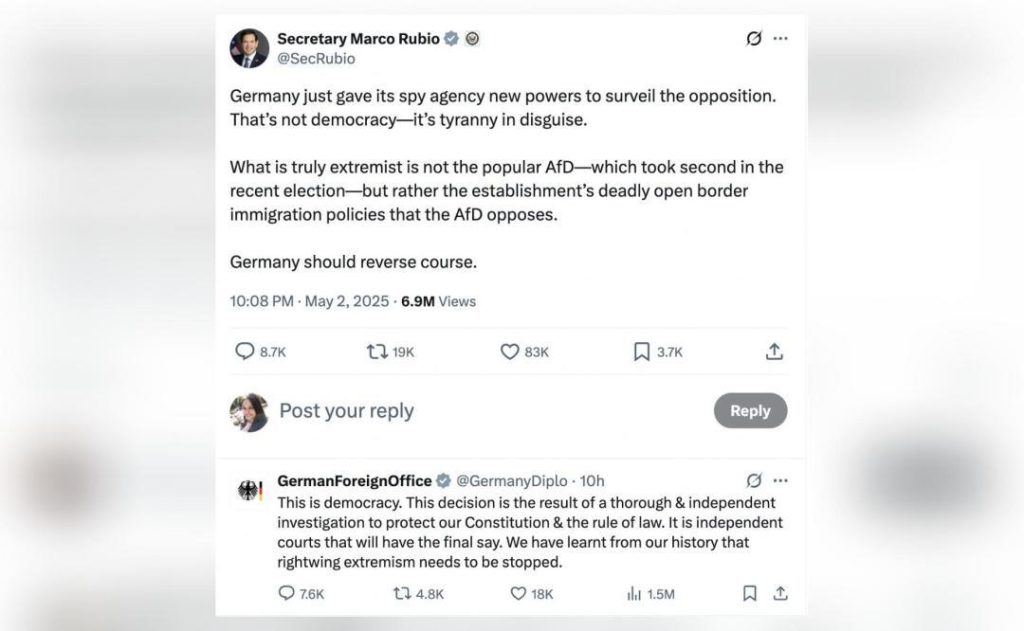
US Secretary of State Marco Rubio & German Govt Clash Over AfD Party’s ‘Extremist’ Tag
In a recent diplomatic spat, US Secretary of State Marco Rubio and the German Foreign Ministry have clashed over the German government’s decision to term the far-right Alternative for Germany (AfD) party as “extremist”. The controversy arose after Germany’s domestic intelligence agency, the Federal Office for the Protection of the Constitution, designated the AfD party as “extremist” due to its alleged ties to neo-Nazis and far-right ideologies.
Rubio, in a statement, accused Germany of enabling “tyranny in disguise” by labeling the AfD party as “extremist”. He argued that the decision was an attack on free speech and political freedom, and that it would lead to a crackdown on political dissent. The US Secretary of State’s remarks were met with a stern reply from the German government, which maintained that the decision was the result of a thorough investigation aimed at protecting Germany’s Constitution.
The controversy surrounding the AfD party has been simmering for some time, with many accusing the party of promoting hate speech, xenophobia, and anti-Semitism. The party has gained popularity in recent years, largely due to its anti-immigrant and anti-establishment rhetoric. However, the decision to label the party as “extremist” has been widely criticized by many in Germany, who argue that it is an attempt to silence political opposition and stifle free speech.
Rubio’s criticism of the German government’s decision has been met with support from some quarters, with many arguing that the label “extremist” is a euphemism for “anti-democratic” and that it poses a threat to the very fabric of German democracy. Others have argued that the decision is a necessary step to protect Germany’s Constitution and to prevent the rise of far-right extremism.
However, many others have criticized Rubio’s remarks, arguing that they are a thinly veiled attempt to undermine the German government’s decision and to promote the AfD party’s extreme ideologies. They argue that the US Secretary of State’s remarks are an affront to Germany’s democratic institutions and that they will only serve to embolden far-right extremists.
The controversy has also raised questions about the role of the US in promoting or undermining democratic values abroad. Critics argue that Rubio’s remarks are an attempt to undermine the German government’s commitment to democracy and human rights, and that they are an affront to the very principles of democratic governance.
In response to Rubio’s criticism, the German government has reiterated its commitment to protecting its Constitution and to preventing the rise of far-right extremism. A spokesperson for the German Foreign Ministry said that the decision to label the AfD party as “extremist” was the result of a thorough investigation aimed at protecting Germany’s democratic institutions. The spokesperson added that the decision was necessary to prevent the spread of hate speech and to promote tolerance and understanding in German society.
The controversy has also raised questions about the role of the media in promoting or undermining democratic values. Critics argue that the media has been complicit in promoting the AfD party’s extreme ideologies and that it has failed to critically examine the party’s views and policies. They argue that the media has a responsibility to promote tolerance and understanding, and to hold political leaders accountable for their actions.
In conclusion, the controversy surrounding the AfD party’s “extremist” designation has raised important questions about the role of politics and the media in promoting or undermining democratic values. While some have criticized the German government’s decision as an attack on free speech and political freedom, others have argued that it is a necessary step to protect Germany’s Constitution and to prevent the rise of far-right extremism. The controversy has also raised questions about the role of the US in promoting or undermining democratic values abroad, and about the responsibility of the media in promoting tolerance and understanding.
Source:



